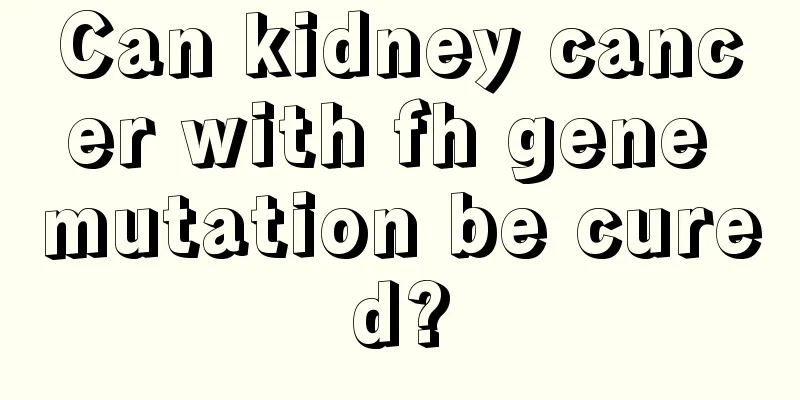Can kidney cancer with fh gene mutation be cured?

|
The treatment of renal cancer with FH gene mutation requires a personalized plan based on the patient's specific situation. Early detection and comprehensive treatment can improve the cure rate. Treatment methods include surgical resection, targeted therapy and immunotherapy, combined with genetic counseling and regular follow-up. 1. Surgical resection is the main treatment for FH gene mutation renal cancer, which is suitable for patients in the early and locally advanced stages. Radical nephrectomy is the standard procedure, which can completely remove tumor tissue. For some patients, nephron-preserving surgery is also an option to help protect renal function. Close monitoring is required after surgery to prevent recurrence. 2. Targeted therapy targets metabolic abnormalities caused by FH gene mutations and inhibits tumor growth by inhibiting specific signaling pathways. Commonly used drugs include mTOR inhibitors and HIF-2α inhibitors, which can effectively control tumor progression. During treatment, it is necessary to monitor drug side effects and adjust the dosage in a timely manner. 3. Immunotherapy activates the patient's own immune system to attack tumor cells and is suitable for patients with advanced or metastatic disease. PD-1/PD-L1 inhibitors are commonly used drugs that can improve patient survival. Biomarker testing is required before treatment to screen suitable patients. 4. Genetic counseling is crucial for patients with renal cancer and their families with FH gene mutations, and helps to understand the genetic risk of the disease. Genetic testing is recommended to clarify the mutation type and inheritance pattern. For patients with fertility needs, preimplantation genetic diagnosis can be considered to reduce the risk of disease in offspring. 5. Regular follow-up is an important part of the management of renal cancer with FH gene mutation, which helps to detect recurrence or metastasis at an early stage. Follow-up includes imaging examination, laboratory examination and clinical symptom assessment. It is recommended to conduct a comprehensive examination every 3-6 months for more than 5 years. The treatment of renal cancer with FH gene mutation requires multidisciplinary collaboration, combining multiple methods such as surgery, targeted therapy and immunotherapy, while paying attention to genetic counseling and long-term follow-up to improve treatment efficacy and patient quality of life. |
<<: Will thyroid cancer cause throat pain?
>>: What kind of tumor is nasal bone tumor?
Recommend
What is the use of sodium lauryl sulfate
Sodium dodecyl sulfate is very unfamiliar to many...
What are the symptoms before the onset of Meniere's syndrome?
Many people are not very clear about what kind of...
Recovery after rhinoplasty prosthesis removal
Although rhinoplasty is a surgery with a relative...
Preventing colon cancer starts with a good lifestyle
At present, the incidence of colon cancer is gett...
My jaw will cramp when I open my mouth wide
I believe many people have encountered cramps in ...
Glioma patients should eat a light diet
For any disease, in addition to treatment, diet i...
How should lung cancer be treated in the late stage? This treatment of late stage lung cancer can prolong life
In life, some lung cancer patients learn that the...
The effect of creatine powder
Creatine powder is relatively unfamiliar to many ...
How to deal with blisters from moxibustion
Moxibustion is a common health-preserving method ...
Wisdom teeth are inside the gums
Wisdom teeth grow inside the gums. In fact, this ...
What's wrong with a high forehead and a flat nose
If we talk about facial features, everyone looks ...
What are the medicinal properties of Cordyceps Flowers
Cordyceps flower is a very common food. Nowadays,...
What are the symptoms of esophageal cancer liver metastasis
Esophageal cancer is a disease that is prone to m...
Analysis of the causes of gastric cancer
As a common malignant tumor in China, the inciden...
How many years of life does glioma last?
Glioma is a brain disease that affects human heal...









